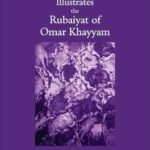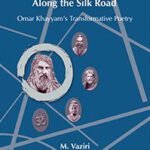For centuries along the vibrant cultural corridor of the Silk Road of Central Asia, philosophers and thinkers from Hellenic, Chinese and Indian traditions debated existential issues. Out of this stimulating milieu, the iconic poet-mathematician Omar Khayyam emerged in the eleventh century, advancing a transformative intercultural philosophy in his poetic work, the Rubaiyat.
Vaziri traces the themes of Khayyam’s Rubaiyat back to the highly influential philosophical traditions of the Silk Road and uncovers fascinating parallels in original works by Heraclitus, Zhuangzi (Daoism), Nagarjuna (Mahayana Buddhism), and the Upanishads. In addition, Vaziri’s elegant translation and unique classification of the verses of the Rubaiyat reveal an existential roadmap laid out by Khayyam.
In this pioneering volume, Vaziri not only fuses the multiple disciplines of literature, philosophy, culture, history and medicine but also takes the approach of the Rubaiyat to a new level, presenting it as a source of wisdom therapy that stands the test of time in the face of doubt and confusion, offering a platform for self-restoration.

